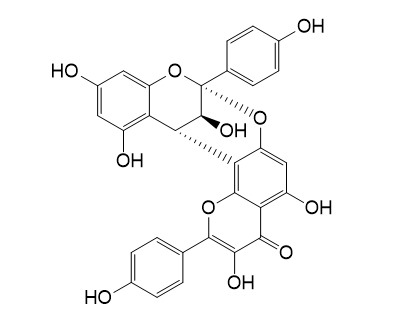Ephedrannin A
Ephedrannin A has Anti-melanogenesis activity. Ephedrannin A has anti-inflammatory activity.
Inquire / Order:
manager@chemfaces.com
Technical Inquiries:
service@chemfaces.com
Tel:
+86-27-84237783
Fax:
+86-27-84254680
Address:
1 Building, No. 83, CheCheng Rd., Wuhan Economic and Technological Development Zone, Wuhan, Hubei 430056, PRC
Providing storage is as stated on the product vial and the vial is kept tightly sealed, the product can be stored for up to
24 months(2-8C).
Wherever possible, you should prepare and use solutions on the same day. However, if you need to make up stock solutions in advance, we recommend that you store the solution as aliquots in tightly sealed vials at -20C. Generally, these will be useable for up to two weeks. Before use, and prior to opening the vial we recommend that you allow your product to equilibrate to room temperature for at least 1 hour.
Need more advice on solubility, usage and handling? Please email to: service@chemfaces.com
The packaging of the product may have turned upside down during transportation, resulting in the natural compounds adhering to the neck or cap of the vial. take the vial out of its packaging and gently shake to let the compounds fall to the bottom of the vial. for liquid products, centrifuge at 200-500 RPM to gather the liquid at the bottom of the vial. try to avoid loss or contamination during handling.
Biomedicines.2022, 10(2):463.
J Pharm Biomed Anal.2019, 172:268-277
HIV Med.2021, 22(8):690-704.
In Vitro Cellular & Developmental Biology - Plant 2021, 57:874¨C882.
Horticulturae2023, 9(2), 213.
Evidence-based Compl.&Alternative Med.2023, 5417813
Antioxidants (Basel).2023, 12(1):189.
Curr Issues Mol Biol.2022, 44(5):2300-2308.
Nutrients.2020, 12(5):1242.
J. Soc. Cosmet. Sci. Korea2021, 47(1):57-63
Related and Featured Products
Biochim Biophys Acta . 2015 Jul;1850(7):1389-1396.
Inhibitory effect of ephedrannins A and B from roots of Ephedra sinica STAPF on melanogenesis[Pubmed:
25857772]
Background: Melanogenesis, a process producing the pigment melanin in human skin, eyes and hair, is a major physiological response against various environmental stresses, in particular exposure to ultraviolet radiation, and its pathway is regulated by a key enzyme, tyrosinase. In this study, we evaluated the effects of ephedrannins A and B, which are polyphenols from the roots of Ephedra sinica, commonly used in herbalism in oriental countries, on mushroom tyrosinase and melanogenesis in B16F10 melanoma cells.
Methods: Their effects on mushroom tyrosinase were determined via kinetic studies using a spectrophotometric analysis and those on melanin and tyrosinase production in melanoma cells treated with α-MSH (melanin stimulating hormone) were examined using PCR and ELISA.
Results: Both ephedrannins A and B exhibited concentration-dependent inhibitory effects on L-tyrosine oxidation by mushroom tyrosinase, and the inhibition mechanism was competitive and reversible with L-tyrosine as the substrate. In addition, melanin production in melanoma cells was also suppressed in a concentration-dependent manner by ephedrannins A and B without significant effects on cell proliferation at the concentrations tested. Both compounds showed inhibitory effects on melanin production by suppressing the transcription of tyrosinase in the cells.
Conclusion: Both compounds exhibited significant inhibitory effects, but the inhibition by ephedrannin B was much more effective than that by Ephedrannin A. Both ephedrannins A and B may be good candidates for a whitening agent for skin.
General significance: This is the first report that describes effective inhibition of melanin production by ephedrannins A and B isolated from Ephedra roots.
Int Immunopharmacol . 2010 Dec;10(12):1616-1625.
Ephedrannin A and B from roots of Ephedra sinica inhibit lipopolysaccharide-induced inflammatory mediators by suppressing nuclear factor-κB activation in RAW 264.7 macrophages[Pubmed:
20939997]
Ephedra sinica is a traditional Chinese medicinal herb and has pharmacological functions including anti-inflammatory effects. However, the active ingredients from Ephedra roots have not been characterized. Here, two active constituents were isolated and their structures and mechanisms of action were defined. Active constituents from Ephedra roots were isolated by continuous solvent-extractions and column chromatography. Their structures were determined by use of multiple types of spectrometry. The mechanisms of action were examined using lipopolysaccharide (LPS)-stimulated RAW 264.7 cells through PCR, ELISA, electrophoretic mobility shift assays, and immunocytochemistry. Two active constituents, Ephedrannin A and B, belonging to the A-type proanthocyanidin family were identified. Both Ephedrannin A and B effectively suppressed the transcription of tumor necrosis factor-α (TNF-α) and interleukin-1β (IL-1β). These compounds exerted their anti-inflammatory actions on LPS-stimulated macrophages by suppressing the translocation of nuclear factor-kappa B (NF-κB) and the phosphorylation of p38 mitogen-activated protein (MAP) kinase. Ephedrannin A and B both exhibited strong anti-inflammatory effects, however, the optimal dose of ephedrannin B was 10 times lower than that of Ephedrannin A. This is the first report describing effective anti-inflammatory activity for Ephedrannin A and B isolated from Ephedra roots. Ephedrannin B may be a good candidate for delaying the progression of human inflammatory diseases and warrants further studies.



